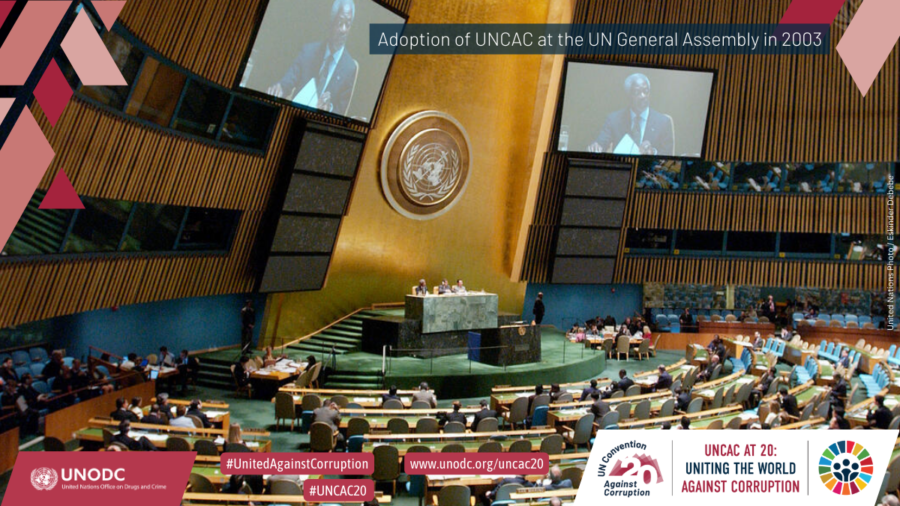31st October 2023 Vienna
Why we need partnership with civil society to tackle corruption

31 October 2003 in New York might have been a typically spooky Halloween day…but in New York’s UN General Assembly I imagine the mood was one of optimism. Because on 31 October 2003, the United Nations General Assembly adopted the UN Convention Against Corruption (UNCAC) and today we celebrate its 20th anniversary.
Put plainly, this Convention is the only legally binding universal anti-corruption instrument. It was negotiated based on consensus, which resulted in 189 States Parties and 140 Signatories. It covers five areas of corruption – preventive measures, criminalisation and law enforcement, international cooperation, asset recovery, and technical assistance and information exchange.
Phil Mason was the UK Anti-corruption Adviser who helped negotiate and draft it at the time. He tells me that “the negotiation of the Convention was done in remarkably quick time and with very little controversy, as if there was a shared sense that its moment had come, such was the optimistic mood of that time.” We shouldn’t underestimate the importance of this as in the UN words like ‘quick’ and ‘little controversy’ aren’t often heard these days!
Have we lived up to that optimism? We can debate the effectiveness of the Convention’s implementation but there is no doubt that without it we would be unlikely to have a meaningful dialogue with other countries or a platform to work together multilaterally to tackle corruption.
Over the 20 years since the UNCAC was adopted we have learned a lot about what enables the Convention to drive change – for the UK it comes down to two key principles: transparency and inclusion of civil society. The UK Government is no stranger to criticism from civil society or the media or even international organisations, but we are fortunate that our open, participatory system of transparency and accountability can drive progress. This sort of approach has been documented by the UNCAC Coalition, who have rightly celebrated countries where civil society UNCAC reports written in parallel with official government reports have led to real change. And this sort of commitment to transparency and inclusiveness is not the preserve of a small group of historically aligned Western states – it underpins Sustainable Development Goal 16 (SDG16) which aims to build “effective, accountable and inclusive institutions”.
The UNCAC includes a mechanism to review its implementation which involves each State Party being reviewed by two peers. The Terms of Reference for this Implementation Review Mechanism (IRM) give countries the option to exercise their rights to transparency and include civil society in the review process. Currently not every State Party opts for these measures but this is what underpins the effectiveness of UNCAC implementation, the UK believes it is time for all State Parties that want UNCAC to fulfil its potential to join together and commit to putting these core principles into practice in their individual UNCAC implementation reviews.
The UK is working with the Open Government Partnership and the UNCAC Coalition to invite interested countries join a collective plenary statement at the UNCAC Conference of States Parties (COSP) in Atlanta this December. The statement and countries’ commitment will show our coordinated support to strengthen the UNCAC IRM. To find out more and join this initiative, please contact my team in Vienna at UKMIS.Vienna@fcdo.gov.uk.
Twenty years after the UNCAC was adopted, now is the time to focus our efforts on implementation to ensure a stronger UNCAC for the next twenty years.